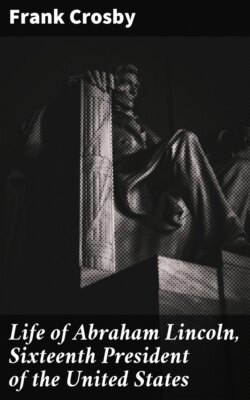Читать книгу Life of Abraham Lincoln, Sixteenth President of the United States - FRANK CROSBY - Страница 9
На сайте Литреса книга снята с продажи.
CHAPTER IV.
NOMINATED AND ELECTED PRESIDENT.
ОглавлениеTable of Contents
The Republican National Convention—Democratic Convention—Constitutional Union Convention—Ballotings at Chicago—The Result—Enthusiastic Reception—Visit to Springfield—Address and Letter of Acceptance—The Campaign—Result of the Election—South Carolina’s Movements—Buchanan’s pusillanimity—Secession of states—Confederate Constitution—Peace Convention—Constitutional Amendments—Terms of the Rebels.
On the 16th of May, 1860, the Republican National Convention met at Chicago, to present candidates for the Presidency and Vice-Presidency. The Democratic Convention had previously adjourned, after a stormy session of some two weeks, at which it was apparent that, if Mr. Douglas’s friends persisted in placing him in nomination, another candidate would be presented by the wing opposed to his peculiar views on the slavery question, and the great party would thus be disrupted. Another convention, claiming to represent, in a peculiarly individual manner, the party in favor of the Constitution and the Union, had met at Baltimore and put in nomination John Bell, of Tennessee, and Edward Everett, of Massachusetts.
The aspect seemed favorable for the election of the Republican candidates, and that convention, on the morning of the 18th of May—one day having been spent in organizing and another in the adoption of a platform of principles—amid the intense excitement of the twelve thousand people inside of the “Wigwam” (as the building was styled in which the body was in session), voted to proceed at once to ballot for a candidate for President of the United States.
Seven names were formally presented in the following order: William H. Seward, of New York; Abraham Lincoln, of Illinois; William L. Dayton, of New Jersey; Simon Cameron, of Pennsylvania; Salmon P. Chase, of Ohio; Edward Bates, of Missouri; and John McLean, of Ohio.
On the first ballot Mr. Seward received 173 votes, Mr. Lincoln 102, Mr. Cameron 50, Mr. Chase 49, Mr. Bates 48, Mr. Dayton 14, Mr. McLean 12, and there were 16 votes scattered among candidates not put in nomination. For a choice, 233 votes were required.
On the second ballot (Mr. Cameron’s name having been withdrawn) the vote for the several candidates was as follows: Mr. Seward 184, Mr. Lincoln 181, Mr. Chase 42, Mr. Bates 35, Mr. Dayton 10, Mr. McLean 8, scattering 4.
The third ballot was immediately taken, and, when the call of the roll was ended, the footings were as follows: For Mr. Lincoln 231, Mr. Seward 180, Mr. Chase 24, Mr. Bates. 22, all others 7. Immediately before the result was announced, four Ohio delegates changed their votes to Mr. Lincoln, giving him a majority.
The scene which followed—the wild, almost delirious outburst of applause within and without the building, the congratulations, the hand-shakings, the various manifestations of joy, continued with scarcely any interruption for some three-quarters of an hour—was probably never before witnessed in a popular assembly.
The nomination having been made unanimous, the ticket was completed by the selection of Senator Hannibal Hamlin, of Maine, as Vice-President.
The country then felt that the right man had for once been put in the right place. As a man of the people, in cordial sympathy with the masses, Mr. Lincoln enjoyed the unhesitating confidence of the sincere friends of free labor, regardless of party distinctions. His tried integrity and incorruptible honesty gave promise of a return to the better days of the republic. Every man, laboring for the advancement of his fellow, knew that in him humanity, irrespective of race or condition, had a tried and trusty friend.
The committee, appointed to apprise him of his nomination, found him at his home, in Springfield, a frame two-storied house, apparently about thirty-five or forty feet square, standing at the corner of two streets. After entering the parlor, which was very plainly furnished, though in good taste, a brief address was made by the chairman of the convention, upon the utterance of the first sentence of which a smile played round Mr. Lincoln’s large, firm-set mouth, his eyes lit up, and his face conveyed to those who then for the first time met him, an impression of that sincere, loving nature which those who had known him long and well had learned in some measure to comprehend and revere.
